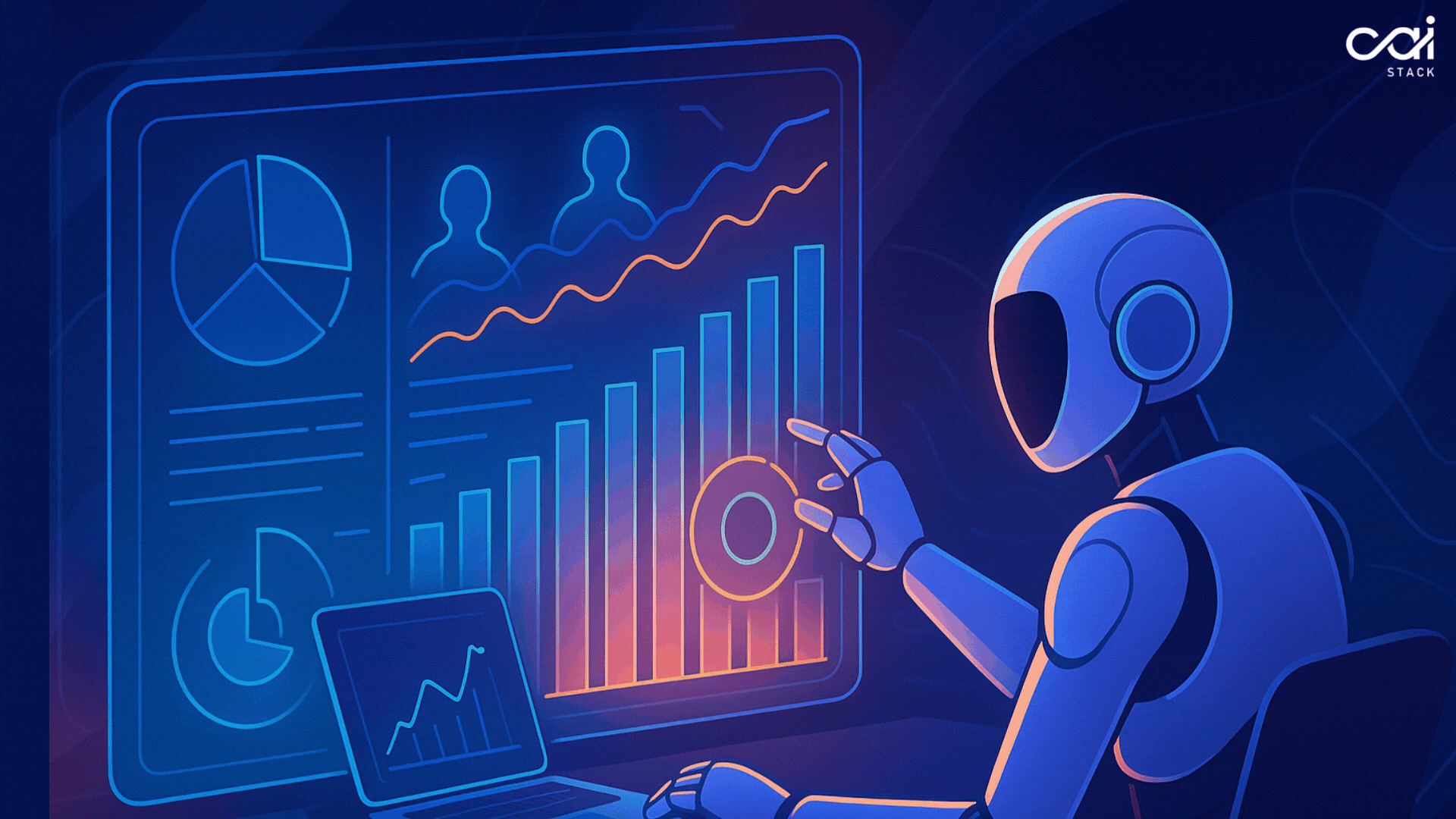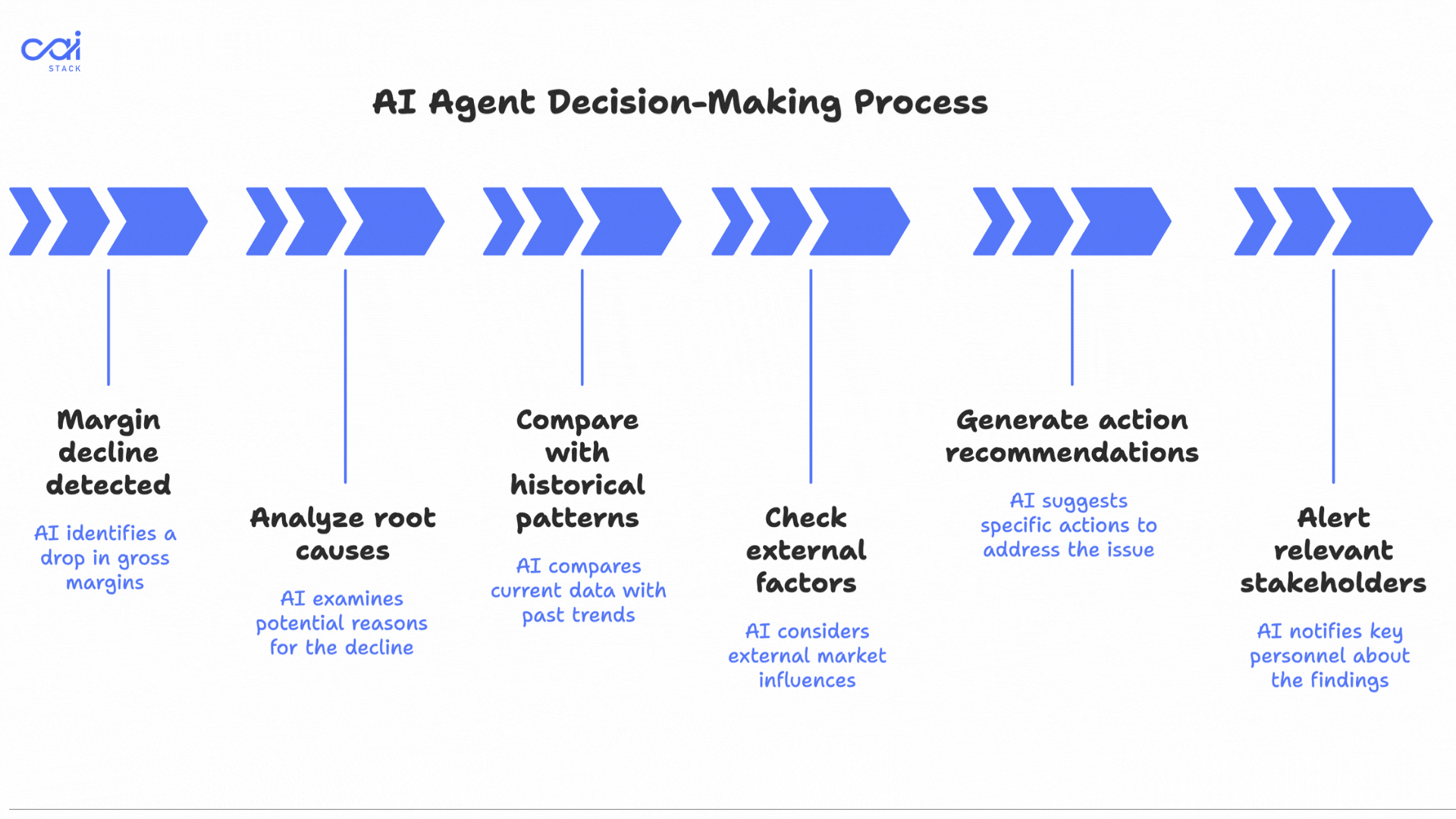AI reporting tools are revising how finance teams work.
No more late nights pulling data from fifteen different spreadsheets.
Let's suppose: It's month-end, and your finance team is drowning in Excel files. Accounting team is manually copying data between systems and cross-referencing budget numbers at midnight.
This chaos is ending faster than you think.
Financial departments are moving from manual data crunching to autonomous data analysis. And it's not just about fancy software anymore. We're talking about AI agents that think, analyze, and report without human babysitting.
The Old Way Is Breaking Down
Manual financial reporting is a mess.
Your team spends 60% of its time gathering data. Only 40% actually analyzing it.
Here's what's wrong with traditional approaches:- Human error rates: Manual data entry typically operates at 96–99% accuracy, compared to 99.959–99.99% for automation, translating to up to 100 times more errors when humans do the work. Automation can reduce manual entry by 80%.
- Time drain: Finance teams waste 20+ hours per month on repetitive tasks
- Slowed insights: By the time reports are ready, business conditions have changed
- Limited scope: Humans can only process extensive information at once
Most companies still rely on:- Multiple disconnected databases
- Manual data extraction processes
- Static reporting templates
- Reactive instead of predictive analysis
In fact, today’s teams spend as much as 80% of their analysis time just preparing data, leaving too little time for actual insight generation.
Enter AI Agents: Your New Financial Analysts
AI agents are autonomous systems that handle end-to-end financial analysis.
They crunch numbers, understand context, spot patterns, and make recommendations.
Here's how they function:
- Data Collection: AI agents connect directly to your financial systems. They perform tasks like collecting data from accounting software, CRM platforms, payment processors, and external market resources.
- Analysis: These agents use algorithms to identify trends, anomalies, and opportunities. They can process thousands of data points in just seconds.
- Reporting: Instead of static reports, your team gets dynamic dashboards with actionable insights. AI tells what the numbers indicate and suggests next steps.
- Learning: The more data these agents process, the better they become at predicting outcomes and flagging important issues.
Nearly two-thirds of companies are piloting or using AI in accounting and FP&A for the assurance of real-time insights and predictive analysis.
Our team at CAI Stack specializes in implementing autonomous data analysis solutions. Schedule a consultation to explore how these tools can reduce your reporting time by 70% while improving accuracy.
The Technology Behind Agent-Powered Decision
Agent support decision-making includes machine learning, natural language processing, and predictive analytics.
Key Features:
- Natural Language Processing: AI agents read and interpret financial documents like humans do. They understand context in contracts, invoices, and regulations.
- Predictive Models: Utilizing historical data, agents forecast future trends. Cash flow predictions, budget variance analysis, and risk assessment happen automatically.
- Integration Capabilities: Modern AI agents connect with business applications through Model Context Protocol (MCP). They communicate seamlessly across the entire tech stack.
- Anomaly Detection: Agents spot unusual patterns that humans sometimes overlook. Fraud indicators, compliance issues, and operational inefficiencies surface immediately.
Academic research on AI agents reports 40% faster processing and a reduction of around 94% in errors in tasks such as budget planning and financial reporting.
Beyond Basic Automation
Traditional automation follows rules. AI agents make decisions.
Measuring Success: What Changes When AI Takes Over
Companies using AI agents note consistent improvements across key metrics:
- Time Consuming: Around 60-80% reduction in manual reporting time
- Accuracy: Error rates decrease from 18% to less than 2%
- Speed: Real-time insights instead of week-old reports
- Coverage: Analysis of 10x more data points than manual processes
AI is expected to reduce finance team costs by 25%, increase productivity by 40%, and free thousands of hours annually.
But the real value is more than efficiency.
Advantages:
- Faster Decision Making: When insights are available in real-time, business decisions happen faster. No more waiting for quarterly reviews to figure out problems.
- More in-depth Analysis: AI agents process complex relationships that humans miss. They connect customer payment patterns with inventory levels, seasonal trends, and market conditions.
- Predictive Capabilities: Instead of explaining what happened last month, you're predicting next quarter's challenges. This shift from reactive to proactive planning changes everything.
- Resource Optimization: Your finance team stops being data processors and becomes strategic advisors. They focus on interpretation and decision-making instead of data gathering.
New AI agents can now save businesses up to 12 hours per month on routine bookkeeping by automating payments, invoicing, and reconciliation.
The Outcome
Here's what changes when you implement agent-led decision support.
Your team produces insights that directly impact business strategy. Board meetings focus on future opportunities, not explaining past variances.
Daily Operations:- Morning briefings include overnight analysis of global market impacts
- Budget reviews happen continuously, not quarterly
- Risk assessments update automatically based on new data
- Performance metrics are tracked in real-time across all business units
Strategic Impact:- Finance becomes a profit center through better decision support
- Predictive models prevent problems before they impact cash flow
- Resource allocation improves through data-driven insights
- Competitive advantages emerge from faster market response
Conclusion: Ending Note
Convert your financial reporting with AI agents designed for precision and speed.
Stay Ahead with AI Insights.
Subscribe to get the latest updates and trends in AI, automation, and intelligent solutions — directly in your inbox.

